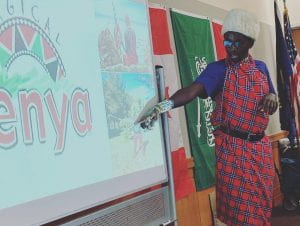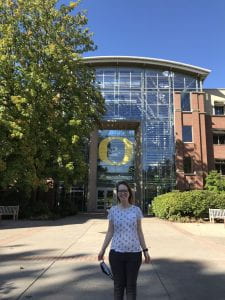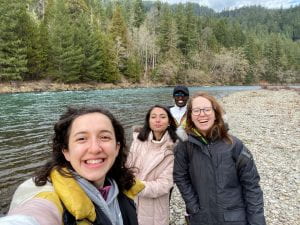It is the end of the 2021-2022 school year and we are saying farewell to this year’s wonderful group of Fulbright Language Teaching Assistants (FLTAs): Mehreen Mehreen from Pakistan, Erick Njue from Kenya, Seçil Ayna from Turkey, and Laura Keidann Rodrigues da Silva from Brazil. These four have had a busy and enriching year, and have made some important connections with our LTS cohort. We interviewed them to let our wider LTS readership learn more about them and what they have been up to. Please see the end of the post to find out more about the FLTA program and the UO Self Study Language Program!
We will miss the four of you. Thank you for making 2021-22 a very special year for us, and please stay in touch with the communities you have found here in Oregon!
What has been your role in the Yamada Language Center and at UO? What kind of classes and students do you work with?
Seçil
I have been a Fulbright Foreign Language Teaching Assistant working as the primary instructor of novice level Turkish classes in the Yamada Language Center at University of Oregon. Turkish is one of the less commonly taught languages offered by our Self Study Language Program. Our students include heritage speakers and/or students who would like to get out of their comfort zone and learn a different language, meet a new culture.
Aside from my primary responsibilities as a teacher, I’ve also taken one class per term a postgrad student. This term, I took a third-year Spanish class where we studied cultural products (e.g., art, literature, film, music) in Spanish-speaking societies in order to build on my Spanish language skills.
Last but not least, I’m a part of the International Cultural Service Program (ICSP). As a cultural ambassador, I share my culture with UO students, schools and community groups. So far, I have organized Turkish movie nights, Turkish coffee hours and celebratory events for Turkish holidays. We were also invited to North Eugene High School with a few other ICSPers where students interviewed us for their school projects to learn more about other cultures around the world. I love inspiring people, especially the young ones. If I can make a difference, I feel alive! That’s why I’m a teacher. 🙂
Erick
I have been a Fulbright Language Teaching Assistant (FLTA) for Swahili. My role has been assisting the primary teacher to instruct Swahili to Freshmen and Sophomore students. The classes range between 8 to 20 students and welcome to all who wish to learn a new language, interact, and have fun!
Laura
I worked as a teaching assistant to the senior instructor of Portuguese, the wonderful Bené Santos. I usually participate in her lessons, but I also get to develop and teach my own lessons sometimes. The UO offers three years of Portuguese courses. Some students already speak Spanish and want to add another Romance Language to their repertoire, while others have Brazilian or Portuguese family members. Outside the classroom, I organized the Portuguese Language Circle, which happens in the Mills International Center every week and is open for the broader UO community. Apart from that, I also created events to promote Brazilian culture, such as the Brazilian Movie Night.
Mehreen
As a Fulbright FLTA (Fulbright Language Teaching Assistant), my primary responsibility was teaching Urdu/Hindi in the self-study program at Yamada Language Center. I usually work with 4-5 students each term who set their own (personalized) goals for language learning. Since the self-study language program is open to all UO students as well as community members, learners have diverse backgrounds. Mostly, learners want to get exposed to the target language through culture, so I look for authentic material in the target language and incorporate those in class activities.
I am also part of the ICSP (International Cultural Service Program) program. As an ICSPer, I represent my country Pakistan in different events and, give presentations in community events and schools. Being a cultural ambassador of my country, I feel immensely proud to remove the misconceptions of people about my country.
Other than that, I have taken courses in Language Teaching Studies and Comparative Literature, both of which have been extremely rewarding for me. I have not only learnt about the different perspectives of teachers and students here, but also gained valuable knowledge about teaching methodologies and classroom management.
What have you enjoyed most about living in Oregon? Has anything surprised you?
Seçil
Outdoors! Hiking, cycling, running… I’m incredibly delighted to be able to do lots of outdoor activities here because they are not easily done back in İstanbul, Turkey – my over-crowded, chaotic home.
What surprised me here in Oregon is that the winter was warmer and drier than I expected. We can observe climate change consequences wherever we go now – at an alarming rate. We all need to ‘Act Now’.
Erick
The most enjoyable moments at Eugene have been Ducks home games, and the serene environment around. I am surprised that Eugene has no traffic and LTD buses are on schedule.
Laura
There are many things that I love about living in Oregon, but what I have enjoyed the most is the nature that surrounds us. I love that I can cycle to campus, which is something that brings me joy even on the most stressful days. When I am in the park or crossing the bridge over the Willamette River, I am amazed at how beautiful it is and at how the landscape somehow looks different every day. I was not aware of the outdoor culture in Oregon before coming here, and I was surprised to discover how much I like it. I was not an outdoorsy person in Brazil, but I have realized that I love hiking and spending time in nature.
Mehreen
I love living around nature and Oregon has dense greenery with flowing waters around. During the Christmas snowfall, I remember, I was out in Alton Baker Park the whole time with my friends. I think I enjoyed that the most. Silver Falls and the coast are my favorite places.
Since you have each taught languages across many contexts, what would you say is most rewarding and important about the profession of language education?
Seçil
Teaching is life-long learning. I think the most rewarding and important about my profession is learning about cultures. Language is inseparable from culture. It is priceless to experience the beauties brought by cultural differences and commonalities. I can sincerely say that I have become a more responsible, open-minded, action-taker world citizen thanks to learning and teaching languages.
Erick
Language education is fun! The world is multilingual. There are people who want to learn the language you speak! Language education is a special way to access any part of the world!
Laura
For me, the most rewarding and important aspect of language education is the interaction with students. Learning their stories and their interests and motivations makes it easier to plan the content and the topics for the lessons, but establishing a connection goes beyond that. I am very thankful for all my teachers, because if I had not studied English, I certainly would not be at UO today. Having this kind of impact, by helping students figure out how they can learn a language and how they can communicate with people from other parts of the globe, is extremely rewarding. Besides, every lesson is different. Even the exact same lesson plan will not result in the same lesson when you are teaching two distinct groups. Students’ questions and comments about language and culture often make me reflect on interesting aspects which had not caught my attention before. Teachers never stop being learners, and that is a wonderful thing.
Mehreen
For me, teaching is yet another chance of learning. In language classes, I see a great diversity which offers me multiple perspectives of thinking. The cultural aspects that I took for granted back in my home country were so meaningful in the language classroom that it made me love my culture even more.
More about the FLTA program and the Self-Study Language Program at UO
The FLTA program, which is sponsored by the U.S. State Department, has three goals for their scholars: to teach their language; to become more skilled and well-rounded as language teaching professionals, and to provide cross cultural outreach on behalf of the university to schools and civic organizations in the local communities where they live.
Since 1997 the Self Study Language Program (SSLP) at the Yamada Language Center (YLC) has been one of the ways that FLTAs can come to the UO to teach their languages. The SSLP is a staple for UO students interested and motivated to learn Less Commonly Taught Languages (LCTLs). And since 2004 close to 30 of the teachers in this special program have been FLTAs. They’ve come from over 15 different countries and have taught Arabic, Hindi-Urdu, Korean Persian, Swahili, Thai, Turkish, Wolof, and Vietnamese. In exchange for offering the language and cultural outreach, they get the opportunity to study at the UO for a year tuition free.
At the UO our FLTAs are connected to three departments: the Yamada Language Center where they work, the Language Teaching Studies program where they are academically hosted, and the International Cultural Service Program (ICSP) where they’re part of a team of more than 40 international students providing education and insight.
Alums of this program have followed many different paths upon completion of their year of service. Several have stayed on or subsequently returned to UO and LTS where they have completed graduate degrees. Some now have jobs at prestigious universities around the world; most return to their country and become active members of their schools and universities.
In a time of limited funding for language study, there probably wouldn’t be an SSLP program without the FLTAs. UO students are deeply appreciative of the opportunities that the SSLP offers and the energy that their tutors bring to their intimate classrooms. Cultural learning is embedded in all that they do.








